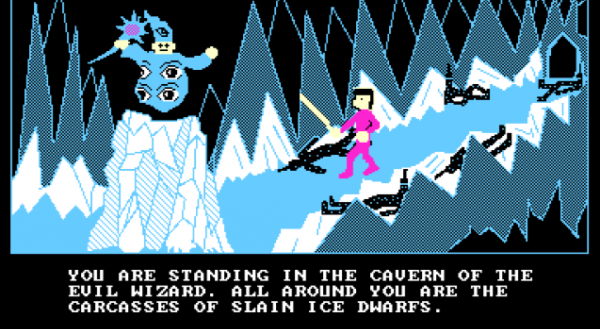Worksheet for GDV talk by Heather Albano
1. In your own words, explain the difference between a parser interactive fiction game and a choose your path interactive fiction game.
Even though parser games and “choose your path” games fall under the interactive fiction game genre and allow players to play these games according to their actions, they have distinct differences in terms of their gameplay.
A parser interactive fiction game is a game in which its story is told through a series of textual accounts and developed through the choices of the player. When a chunk of text is given to the player, the player can respond to the text by typing in anything that relates to the current situation. If the response is valid, another series of text will appear that shows the result of the player’s action. This routine will continue until the player reaches the end of the game.
A “choose your path” interactive fiction game has a similar concept to a parser interactive fiction game, but the story of the game is developed through choices that the game offers to the player. After the player is given a textual account, the game will present a certain amount of decisions that the player can make. The player will then see the result of his or her actions and a new set of choices will be made available. The player will go through a series of multiple scenarios, choices, and results in this matter until the player comes to the end of the game.
2. Name an example of a parser game.
An example of a parser interactive fiction game is Planetfall. Planetfall is a game made by Infocom in 1983 that recalls the adventures of a low-rank patrol soldier through space.
3. Name an example of a choose your own path game.
An example of a “choose your path” interactive fiction game is any game from the Ace Attorney series. The Ace Attorney games are courtroom-style games that are owned by Capcom in which the player controls an attorney named Phoenix Wright through dramatic, comical, and creative court cases.
4. Why does she say interactive fiction virtually died out in the mid-1990s?
With the acquisition of Infocom by Activision, the production levels of interactive fiction games began to decline in the 1990s. Also, the overwhelming challenge that branching narrative provided for developers and the demanding nature of some interactive fiction games led to the decline of interactive fiction in the 1990s.
5. Why does she say poetry is an important element of interactive fiction writing? What example does she use?
Games that belong to the interactive fiction genre rely on text to tell their stories, describe their characters, and generate mental images of their environments. For this reason, every word and every phrase needs to be carefully chosen and placed within the structure of the text in order to create a descriptive narrative that makes the game come alive in the mind of the player. According to Heather Albano, poetry in interactive fiction relates to the descriptive quality of the prose. She also explains that the descriptive prose of an interactive fiction game gives the player the ability to investigate the world of the game through text alone. Heather utilizes a few excerpts from a game titled With Those We Love Alive as examples of poetry in interactive fiction. In the excerpts, certain words are highlighted within the text. When a highlighted term is selected, more information is given to the player about that term.
6. Why does she say that ambiguity is not only unavoidable but also necessary?
Since interactive fiction games majorly rely on text to tell a story, it is impossible for the developers to describe every detail of the game’s atmosphere. For this reason, Heather Albano explains that developers utilize ambiguity to give short descriptions that can provide a sufficient mental image of the game’s world to the player. Aside from inevitable ambiguity, Albano states that ambiguity is imperative in the development of interactive fiction games because it allows players to use their imaginations, create their own stories, draw their own conclusions, and immerse themselves in the world of the game in their own way. In other words, ambiguity provides interactive fiction games with replay value.
7. What’s important about complicity?
When an interactive fiction game possesses complicity, it transfers the responsibility of telling the story of the game to the player. Complicity allows players to take ownership of their gaming experiences and gain the ability to change the story according to their interests.
Leave a Reply
You must be logged in to post a comment.



